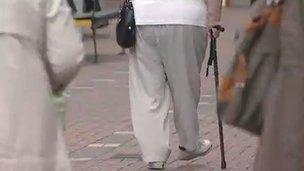With Swindon's elderly population set to double, can the council afford their care?
- Published

Elderly care costs Swindon Borough Council £16m a year, about 12% of its budget
Over the next 25 years the size of the elderly population in Swindon is set to almost double from 30,000 to nearly 60,000.
It is the highest percentage increase of any local authority in the West.
But with care services already stretched, can Swindon Borough Council afford to care for the town's over-65s?
Elderly care costs Swindon Borough Council about £16m a year, about 12% of its budget.
Councillor Brian Mattock said the "demand pressures" for adult social care were considerable.
"All the forecasts are that they will continue in that upward direction," he said.
"Obviously government resources to local authorities, over the last three years, have been going in a downward direction - a 25% to 30% reduction - at the same time as the demand for adult social care has been going skywards."
In the years immediately following Word War II people were encouraged to have more babies, and the UK experienced an upsurge in birth rates.
At the same time Swindon's adult population was boosted by workers from around the country attracted by the town's booming industry.
Since then, with advances in health, diet and medicine, most of these people have gone on to live to a ripe old age.

Mick Davis, 74, has three 15-minute visits from care workers a day and spends nearly 23 hours alone
Mick Davis is one of 3,500 elderly people in Swindon who have their care paid for by the local authority.
He is 74 years old, has chronic obstructive pulmonary disease and is attached permanently to an oxygen supply.
He receives three 15-minute visits a day from carers, but he craves company.
"I get 22 hours a day [alone]," he said. "I'm on my own, looking out the window - not much to look at... stuck in here. [It's] like being in a jail cell."
His carer, Gemma Jarvis from Prestige Nursing and Care, has 20 clients a day and her schedule allows only for whistle-stop visits.
"It would be nice to have a sit down and a chat and a coffee," said Ms Jarvis. "But it is quite tough to get around to everybody."
'More resources'
Next year the council estimates demand for elderly care will rise by £1m and the challenge it faces is meeting that demand without affecting services.
One of the solutions it is investigating is increasing its reliance on volunteers.
At the moment the voluntary sector offers a host of care services including befriending, activity clubs and manicures - all once provided by local authorities.
But even with a beefed-up voluntary sector, local authorities will need to find a lot more money.
"In Swindon we have been making tens of millions of pounds of savings over the last few years and there does come a point where you cannot make savings of that magnitude - and I think we are nearing that point now," said Councillor Mattock.
"We are as lean and mean as possible and as efficient as possible to provide the services that are needed. We need to then say we've done our bit, central government now need to provide more resources."
Future of care for the elderly: an Inside Out special is on BBC One West on Monday at 19:30 BST.
- Published15 October 2012